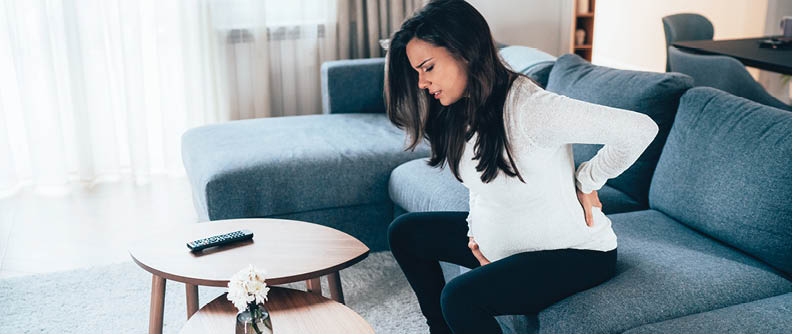New discomforts are common in the third trimester of pregnancy. Read on to learn more about some of the specific issues to expect and get some tips for feeling better.
Shortness of breath
You naturally breathe more while you’re pregnant to provide extra oxygen to your developing baby. Also, as your uterus gets bigger, it may press up against your diaphragm. This can crowd your lungs and make it harder for you to catch your breath.
Most people find it easier to breathe once their baby settles down into the pelvis. Before that happens, you can breathe easier by:
- Avoiding caffeine-containing drinks, such as coffee or soda.
- Taking a deep breath while you raise your arm over your head. Then breathe out while you lower your arm.
- Drinking plenty of water throughout your day.
- Eating smaller, more frequent meals.
- Resting frequently throughout the day.
- Sleeping with your upper body raised a bit.
- Sitting up as straight as possible.
- Wearing loose-fitting clothing around your waist.
Call 911 or go to the nearest hospital immediately if you have shortness of breath with:
- Blue coloring around your fingernails or lips.
- Chest pain.
- Rapid breathing with rapid pulse.
- Sudden or severe shortness of breath.
Painful kicks
As your baby gets bigger and tries to get comfortable in the womb, you might experience more painful kicks compared to earlier weeks of your pregnancy. Your baby settling into your pelvis usually helps. To get more comfortable:
- Change your position, and hopefully your baby will change their position too.
- Take a deep breath while you raise your arm over your head. Then breathe out while you lower your arm.
- Cup your hands around your baby’s buttocks and gently move the baby.
Hemorrhoids
For many, hemorrhoids develop in the later weeks of pregnancy. They’re blood vessels in the rectum that get wider or become twisted. This happens because your uterus pushes on these blood vessels.
Hemorrhoids usually cause pain, itching or bleeding during bowel movements. They typically get better on their own after birth, but you can also take these steps to lessen symptoms:
- Keep stools soft by eating high-fiber foods and drinking plenty of water.
- Avoid sitting for long periods of time. Lie on your side several times a day.
- Clean the area with moist toilet paper, witch hazel pads, Tucks pads, or a similar hemorrhoid-relief pad.
- Apply ice packs to relieve discomfort.
- Take what’s known as a sitz bath several times a day for 20 minutes at a time, by sitting in a warm-water bath with only your hips and buttocks covered.
- Use products like Preparation H, Anusol, or 1% hydrocortisone cream for pain relief.
Sciatic nerve discomfort
The sciatic nerve starts in the lower part of the spine. If your baby’s head rests on your spine, you could have sciatic nerve discomfort. Also, certain hormones work to prepare your body for birth by causing your pelvic joints to relax and stretch. This can also put pressure on the nerve and cause symptoms.
With sciatic nerve discomfort, symptoms such as weakness, tingling, and numbness are possible. Also, you could have pain that starts in your buttocks or back and moves down your leg into your foot.
To relieve sciatic nerve pain:
- Alternate short walks with lying down.
- Don’t sit for long periods of time.
- Sit in a warm bath or take a warm shower.
- Stretch your legs and back. Try to find the stretching positions that feel best to you.
- Use a heating pad on the area.
- Try a maternity support belt or belly band
- Sleep or rest on the side that is pain free
Keep in mind that sciatic nerve pain usually gets better after giving birth.
